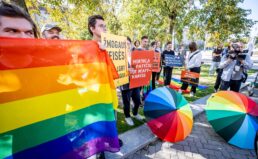Malta’s minister for civil liberties has kicked off a conference on LGBTI rights across the EU with a call for politicians to swim against the tide by “helping shape public opinion, not to be led by it”.
Helena Dalli was speaking in Malta on Thursday, 23 February 2017, at a high-level ministerial conference on LGBTI rights, as part of the ongoing Maltese EU presidency.
And she cited her own country, the socially-conservative Mediterranean island with less than 500,000 citizens, as a casebook example of country previously lagging in sexual and gender rights, playing rapid catch-up.
She told an audience in Valletta that Malta and other states were seen as “not ripe for progress” but that they can “change, and change fast”.
“Politicians are there to help shape public opinion, not be led by it”, she said.
Notoriously, Malta is the only EU member state to ban abortion entirely – although Ireland, and Northern Ireland, have severe restrictions.
However, Dalli pointed to a trio of recent liberal moves in the island state: firstly, legislating for civil partnerships in April 2014.
That legislation is now being updated to bring in full gay marriage.
Secondly, as of September 2016, all toilets in government buildings were gender-neutral – something Dalli pointed out was now being reversed on the day she spoke by US President Donald Trump.
And, finally, Malta’s cabinet had decided that day to bring in “non-binary gender” classifications on IDs and passports.
Other speakers at the conference included Tiina Astola, director-general of EU Justice and Consumers, European Agency for Fundamental Rights Director Michael O’Flaherty and EU Parliament Vice-President Ulrike Lunacek.
They heard the results of a survey of 93,000 LGBT people across the EU that found that 47% had been the victim of discrimination in the past 12 months.
Of those, 90% did not report it to police or authorities.
Some 66% avoided holding hands in public, and 80% had heard jokes directed against the LGBTI community.
Finally, 20% had been discriminated against either at work, or in applying for jobs.
However, the ILGA – the International Lesbian, Gay, Bisexual, Trans and Intersex Association – demanded greater leadership from the EU on the issues.
“The EU Commission has set out a List of Actions they are taking to progress equality for LGBTIQ people throughout Europe. This is a good base from which to build, but the critical ingredient to drive real progress on the ground for LGBTIQ people and their families will be greater leadership from the EU”, said Katrin Hugendubel, ILGA-Europe’s Advocacy Director, speaking at the conference.
Another ILGA member, Brian Sheehan, who was co-chairing the event, said there was a ‘silent majority’ for further progress in the EU on LGBTI inclusivity.
“It is clear from EU … research that the ‘silent majority’ within Europe strongly support progress on inclusion of LGBTI people. Our collective challenge is to give a voice to that majority in an atmosphere that sees increasing threats to progress on rights ” Sheehan told the conference.
Dalli, however, warned that there were some things the EU alone could not solve, pointing out one in particular by asking “How do we ensure online platforms are not a space for hate speech?”




